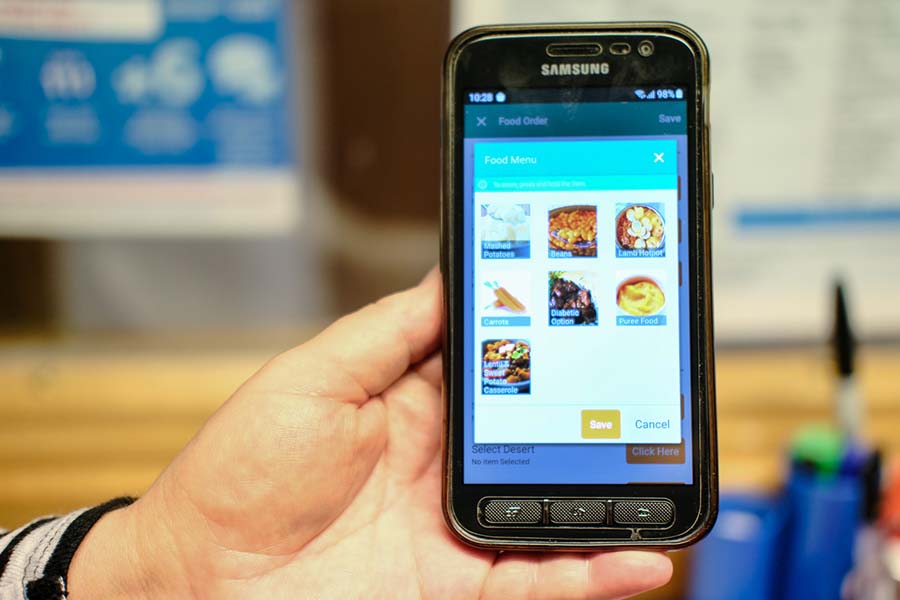Making sure that care home residents eat nutritionally balanced, healthy, tasty meals is paramount to safeguarding their care and wellbeing. After all, “we are what we eat” and our state of health depends a lot on the type, quality and amount of food and drink we consume. Some people need to pay more attention to what they eat than others, for example those with allergies, issues with weight gain or loss and cultural or religious limitations placed on their diet. Others may need temporary changes to their meals after an operation, illness or injury. Or adjustments to compensate for medications, monitoring or treatments they are on.
All of this can make for complicated meal and nutrition planning, which takes up a lot of time if it is not properly organised. Person-led care is big news right now and this also includes making sure that individuals can have access to the right kind of food for their nutritional needs and personal preferences. Then, there is the need to plan for seasonal changes and themed meals for festivals and events.
That’s where Care Vision’s Chef Module comes in. Using personalised data and expert nutritional guidelines, it supports the catering and meal planning teams to create customised meal plans. The system can also draw up ingredient lists to ensure that supplies can be procured when required, in the correct quantities to reduce wastage, cut costs and help with future planning.

What else can the Chef Module do?
As well as meal planning and nutritional advice, the Chef Module offers catering teams options to design and print menus with customisable descriptions and photos. Details of ingredients’ nutritional contents can also be accessed, including salt levels and fat contents. Carers can also use the tool to help track residents’ weight, food and fluid intake and BMI scores. This provides valuable data around general wellbeing and food choices.
Residents’ personal data can include allergies and intolerances to prevent health issues arising, while information around sleep, mood and medications can be aligned with nutritional reports for a wider picture of a resident’s state of health. Finally, the module shares important information around food hygiene tips, fridge temperature checks and messages from other departments.
Helping residents eat well during Winter
It is especially essential that older people and those requiring residential care eat well during the colder winter months. This is because the colder temperatures mean that their bodies must work harder to stay warm and so require additional fuel. This doesn’t mean consuming more empty calories. In fact, older people are advised to reduce the amount of sugary and fatty snacks that they eat. As we age, we tend to do less exercise compared to our younger years and so have fewer opportunities to burn off any excess calories.

Instead, make sure your residents eat plenty foods rich in minerals and vitamins to help support their immune system and overall health. Some key minerals and vitamins include calcium to strengthen bones and reduce the risk of fractures and osteoporosis. This is found in dairy products, leafy vegetables and canned fish such as sardines. In colder weather, a mug of warm milk can also be very comforting just before bed.
Iron is also key for health during the winter and found in red meat, pulses, eggs, bread and green vegetables. Vitamin C also helps to absorb iron, so it’s vital in the winter months. It also helps shore up the body’s immune system against attack from colds and is found in citrus fruits, peppers, potatoes and tomatoes. Another key vitamin is Vitamin D for healthy bones, teeth and muscles. We get much of our Vitamin D intake from sunlight, so it might be worth investigating providing some Vitamin D supplements to vulnerable residents during the winter months when there is less sun and fewer opportunities to venture outdoors.
Finally, encourage your residents to eat by offering opportunities throughout the day. Some people like to eat little and often, rather than relying on three heavier meals per day. So, make the most of elevenses, tea time and bed time drinks to encourage people to take in a comforting hot drink or light snack to keep their energy levels up. If you have concerns about a resident’s food or fluid intake during the winter, use the monitoring tools on Care Vision to keep track of what they are eating and drinking in a day, week or longer period of time.





